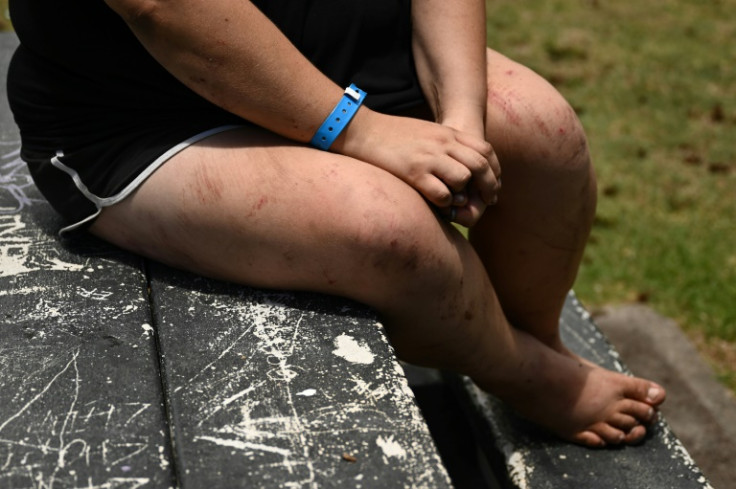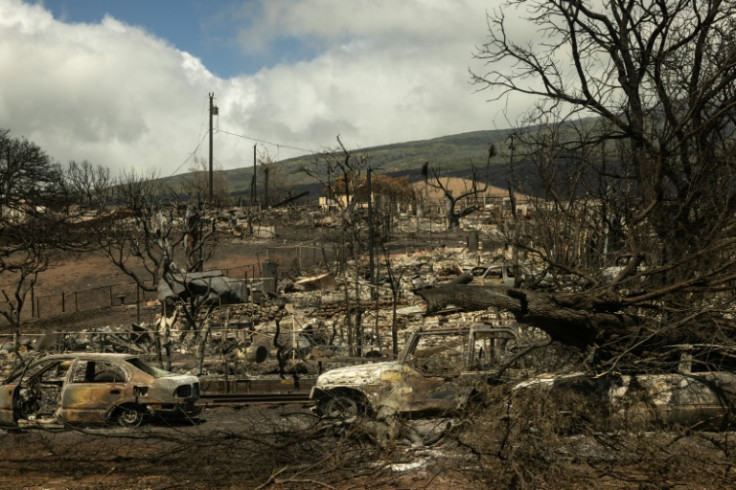'The Ocean Saved My Life': How One Hawaii Survivor Escaped The Flames

Surrounded by flames on Hawaii's scenic Lahaina boardwalk with cars exploding in the heat around her, Annelise Cochran decided jumping into the sea was her only choice.
"It was seconds. And it almost didn't feel like a decision that I was really making. Because there only seemed to be one option," Cochran told AFP six days after surviving a raging wildfire that destroyed the small resort community on Maui's west coast.
The 30-year-old, an experienced swimmer who works for the non-profit organization Pacific Whale Foundation, lost neighbors and friends -- as well as her apartment, car, and pet bird -- in the tragedy that has left almost 100 dead and more than 1,000 missing.
But she survived, in part thanks to her knowledge of the sea.
"I feel very blessed that I have the connection with the ocean that I do, because I think it helped keep me safe that night. The ocean did literally save my life."
Tuesday, August 8, was like any other in an oceanside paradise, Cochran recalled.
There were threats of fire from the mountain above Lahaina, but announcements that the flames had been contained reassured her. There was also no evacuation order.
Shortly after 3:00 pm (0100 GMT), she smelled burning.
"We saw smoke billowing and the blue sky had turned a dark shade of brown and the wind was whipping at 80-plus miles an hour. It was very, very fast; shocking to see," the young woman said outside the War Memorial Complex in Kahului, where she has been sheltering since the tragedy.
"We saw flames, and we realized it was coming right for us."
Cochran grabbed her bag, a scrapbook and photos, and drove off in her car. She also grabbed her bird, Chickadee, but it died in the escape.
"Everything was pitch black," she said. "I couldn't see more than an inch in front of my windshield."
She stopped a few meters from Front Street, the main street in Lahaina, which faces the boardwalk.
"People had parked their cars in the road and started getting out and running. And, as such, no cars could get through. And I realized in that moment that no fire trucks could get in either.
"And so where I was, there wasn't going to be any rescue -- or at least not for a really, really long time."
Cochran ran into some neighbors and learned that the flames were hot on their heels when abandoned cars began to explode.
Scared, she decided to jump into the sea with her neighbor, a middle-aged woman called Edna, to protect herself from the embers.
"We fully submerged ourselves into the water to get our faces down as much as we could, so that we were breathing the air that was only on the surface of the water, because the air got very acrid and horrible to breathe," she said.
The women clung to the rock wall on the end of the boardwalk.
"We got as low as we could but at that point Edna and I both started to lose consciousness, we began to hallucinate, I would kind of pass out into the water. As my face hit the water, I would come to again and realize where I was and what was going on."
At 9:30 pm, Cochran managed to call the emergency services from her phone, protected in the stone wall, around which about 40 people had gathered.
"But they told us there was no way to rescue us yet."
At around 11:00 pm they saw a Coast Guard boat rescuing dozens of people who were offshore, but the boat had no way to get close to the cobbled coast, so the wait continued, for a total of about eight hours.
"I would say that I spent at least five of those hours completely submerged up to my neck in the water trying to protect myself against the embers," Cochran said.
"But it got so cold that at times we would have to actually climb the wall and go as close as we could to the fire comfortably to warm our bodies. It's one of the reasons I'm covered in burns and scrapes," she said, pointing to the many cuts on her legs and arms.
The survivors were finally rescued around midnight by firefighters who took them first to a nearby business that survived the inferno, and eventually to a shelter in the early morning.
The young woman, who plans to return to her parents' house in Washington to process what she has experienced, says the Lahaina community is "very angry" with its authorities.
"This situation is bordering on negligent in my opinion," she said.
"The only reason that I'm here today is because I took it into my own hands."
Having lived in the now-devastated coastal city for almost eight years, Cochran mourns this town steeped in history.
"The thought of losing our beautiful Lahaina town and the memories there, and knowing that I'll never just take a stroll down Front Street again, is almost incomprehensible," she said.
"But I'm just really blessed for life and glad I'm here. And so that's the most important thing."


© Copyright AFP 2024. All rights reserved.





















